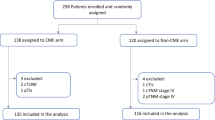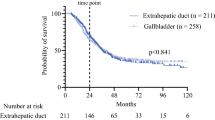Abstract
Purpose
To investigate the correlation between number of retrieved lymph nodes (rLNs) and prognosis and further ascertain the optimal number of rLNs with a beneficial survival impact in patients with pN0 colon cancer.
Methods
The Surveillance, Epidemiology, and End Results (SEER) database was searched for pN0 colon cancer cases. X-Tile software and Kaplan–Meier survival analysis were applied to determine the optimal number of rLNs based on the minimal probability (P) value and the largest χ2 value. Univariate analyses and Cox proportional hazard regression model were used to investigate the relationship between rLN number and overall survival. Multiple analyses were conducted to assess the prognostic predictive ability of the identified optimal rLN cut-off value under different stratifications. Nomograms were established based on the independent prognostic factors selected by the multivariate analysis to predict 3- and 5-year overall survival rates of pN0 patients.
Results
A total of 6269 pN0 colon cancer patients who underwent surgical therapy were finally included for analysis. Harvest of at least 18 lymph nodes was determined as the optimal rLN number. This cut-off rLN value (< 18 versus ≥ 18) was identified as an independent prognostic factor (P < 0.001) of overall survival via multivariate analysis. Similar findings were obtained in patients with retrieval of at least 12 lymph nodes (18 > rLNs ≥ 12 versus rLNs ≥ 18) stratified into several groups.
Conclusions
The number of rLNs was identified as an independent prognostic factor for pN0 colon cancer. Retrieval of at least 18 lymph nodes was associated with favorable prognosis in patients with pN0 colon cancer, and should, therefore, be regarded as an alternative cut-off value for survival analysis.









Similar content being viewed by others
Data availability
The data sets used and/or analyzed during the current study are available from the SEER database.
Abbreviations
- AJCC:
-
American Joint Committee on Cancer
- CI:
-
Confidence interval
- HR:
-
Hazard ratio
- pT stage:
-
Pathological T stage
- pN stage:
-
Pathological N stage
- pN0:
-
Node-negative
- rLNs:
-
Retrieved lymph nodes
- SEER:
-
Surveillance, Epidemiology, and End Results
- TNM:
-
Tumor/node/metastasis
- UICC:
-
Union for International Cancer Control
References
Agha R, Abdall-Razak A, Crossley E, Dowlut N, Iosifidis C, Mathew G, STROCSS Group (2019) The STROCSS 2019 guideline: strengthening the reporting of cohort studies in surgery. Int J Surg 72:156–165. https://doi.org/10.1016/j.ijsu.2019.11.002
Amin MB, Edge SB (2017) AJCC cancer staging manual, 8th edn. Springer, New York
Amin MB, Greene FL, Edge SB et al (2017) The eighth editions AJCC cancer staging manual: continuing to build a bridge from a population-based to a more “personalized” approach to cancer staging. CA Cancer J Clin 67:93–99. https://doi.org/10.3322/caac.21388
Baxter NN, Virnig DJ, Rothenberger DA, Morris AM, Jessurun J, Virnig BA (2005) Lymph node evaluation in colorectal cancer patients: a population-based study. J Natl Cancer Inst 97:219–225. https://doi.org/10.1093/jnci/dji020
Baxter NN, Ricciardi R, Simunovic M, Urbach DR, Virnig BA (2010) An evaluation of the relationship between lymph node number and staging in pT3 colon cancer using population-based data. Dis Colon Rectum 53:65–70. https://doi.org/10.1007/DCR.0b013e3181c70425
Brierley JD, Gospodarowicz MK, Wittekind C (2017) The TNM classification of malignant tumours, 8th edn. Wiley Blackwell, Oxford
Camp RL, Dolled-Filhart M, Rimm DL (2004) X-tile: a new bio-informatics tool for biomarker assessment and outcome-based cut-point optimization. Clin Cancer Res 10:7252–7259. https://doi.org/10.1158/1078-0432.CCR-04-0713
Caplin S, Cerottini JP, Bosman FT, Constanda MT, Givel JC (1998) For patients with Dukes' B (TNM Stage II) colorectal carcinoma, examination of six or fewer lymph nodes is related to poor prognosis. Cancer 83:666–672. https://doi.org/10.1002/(sici)1097-0142(19980815)83:4%3c666:aid-cncr6%3e3.0.co;2-i
Chau I, Cunningham D (2002) Adjuvant therapy in colon cancer: current status and future directions. Cancer Treat Rev 28:223–236. https://doi.org/10.1016/s0305-7372(02)00047-6
Chen SL, Bilchik AJ (2006) More extensive nodal dissection improves survival for stages I to III of colon cancer: a population-based study. Ann Surg 244:602–610. https://doi.org/10.1097/01.sla.0000237655.11717.50
Chen SL, Steele SR, Eberhardt J, Zhu K, Bilchik A, Stojadinovic A (2011) Lymph node ratio as a quality and prognostic indicator in stage III colon cancer. Ann Surg 253:82–87. https://doi.org/10.1097/SLA.0b013e3181ffa780
Compton C, Fenoglio-Preiser CM, Pettigrew N (2000) American Joint Committee on Cancer Prognostic Factors Consensus Conference: Colorectal Working Group. Cancer 88:1739–1757. https://doi.org/10.1002/(sici)1097-0142(20000401)88:7%3c1739:aid-cncr30%3e3.0.co;2-t
Evans MD, Barton K, Rees A, Stamatakis JD, Karandikar SS (2008) The impact of surgeon and pathologist on lymph node retrieval in colorectal cancer and its impact on survival for patients with Dukes' stage B disease. Colorectal Dis 10:157–164. https://doi.org/10.1111/j.1463-1318.2007.01225.x
Gajra A, Newman N, Gamble GP, Kohman LJ, Graziano SL (2003) Effect of number of lymph nodes sampled on outcome in patients with stage I non-small-cell lung cancer. J Clin Oncol 21:1029–1034. https://doi.org/10.1200/JCO.2003.07.010
Goldstein NS (2002) Lymph node recoveries from 2427 pT3 colorectal resection specimens spanning 45 years: recommendations for a minimum number of recovered lymph nodes based on predictive probabilities. Am J Surg Pathol 26:179–189. https://doi.org/10.1097/00000478-200202000-00004
Hayashi S, Kanda M, Ito S et al (2019) Number of retrieved lymph nodes is an independent prognostic factor after total gastrectomy for patients with stage III gastric cancer: propensity score matching analysis of a multi-institutiondataset. Gastric Cancer 22:853–863. https://doi.org/10.1007/s10120-018-0902-2
He WZ, Xie QK, Hu WM, Kong PF, Yang L, Yang YZ, Jiang C (2018) An increased number of negative lymph nodes is associated with a higher immune response and longer survival in colon cancer patients. Cancer Manag Res 10:1597–1604. https://doi.org/10.2147/CMAR.S160100
Herr HW, Bochner BH, Dalbagni G, Donat SM, Reuter VE, Bajorin DF (2002) Impact of the number of lymph nodes retrieved on outcome in patients with muscle invasive bladder cancer. J Urol 167:1295–1298. https://doi.org/10.1016/s0022-5347(05)65284-6
Jestin P, Påhlman L, Glimelius B, Gunnarsson U (2005) Cancer staging and survival in colon cancer is dependent on the quality of the pathologists’ specimen examination. Eur J Cancer 41:2071–2078. https://doi.org/10.1016/j.ejca.2005.06.012
Johnson PM, Malatjalian D, Porter GA (2002) Adequacy of nodal harvest in colorectal cancer: a consecutive cohort study. J Gastrointest Surg 6:883–888. https://doi.org/10.1016/s1091-255x(02)00131-2
Joseph NE, Sigurdson ER, Hanlon AL et al (2003) Accuracy of determining nodal negativity in colorectal cancer on the basis of the number of nodes retrieved on resection. Ann Surg Oncol 10:213–218. https://doi.org/10.1245/aso.2003.03.059
Law CH, Wright FC, Rapanos T, Alzahrani M, Hanna SS, Khalifa M, Smith AJ (2003) Impact of lymph node retrieval and pathological ultra-staging on the prognosis of stage II colon cancer. J Surg Oncol 84:120–126. https://doi.org/10.1002/jso.10309
Le Voyer TE, Sigurdson ER, Hanlon AL, Mayer RJ, Macdonald JS, Catalano PJ, Haller DG (2003) Colon cancer survival is associated with increasing number of lymph nodes analyzed: a secondary survey of intergroup trial INT-0089. J Clin Oncol 21:2912–2919. https://doi.org/10.1200/JCO.2003.05.062
National Cancer Institute (2018) Surveillance, epidemiology, and end results (SEER) program, research data (1973–2015). National Cancer Institute: Bethesda, MD, USA. www.seer.cancer.gov. Accessed 19 Feb 2019
O'Sullivan B, Brierley J, Byrd D et al (2017) The TNM classification of malignant tumours-towards common understanding and reasonable expectations. Lancet Oncol 18:849–851. https://doi.org/10.1016/S1470-2045(17)30438-2
Pan S, Wang P, Xing Y, Li K, Wang Z, Xu H, Zhu Z (2019) Retrieved lymph nodes from different anatomic groups in gastric cancer: a proposed optimal number, comparison with other nodal classification strategies and its impact on prognosis. Cancer Commun (Lond) 39:49. https://doi.org/10.1186/s40880-019-0394-4
Parsons HM, Tuttle TM, Kuntz KM, Begun JW, McGovern PM, Virnig BA (2011) Association between lymph node evaluation for colon cancer and node positivity over the past 20 years. JAMA 306:1089–1097. https://doi.org/10.1001/jama.2011.1285
Pinato DJ, Howlett S, Ottaviani D et al (2019) Association of prior antibiotic treatment with survival and response to immune checkpoint inhibitor therapy in patients with cancer. JAMA Oncol. https://doi.org/10.1001/jamaoncol.2019.2785
Quan Q, Zhu M, Liu S et al (2019) Positive impact of the negative lymph node count on the survival rate of stage III colon cancer with pN1 and right-side disease. J Cancer 10:1052–1059. https://doi.org/10.7150/jca.23763
Sarli L, Bader G, Iusco D et al (2005) Number of lymph nodes examined and prognosis of TNM stage II colorectal cancer. Eur J Cancer 41:272–279. https://doi.org/10.1016/j.ejca.2004.10.010
Shanmugam C, Hines RB, Jhala NC et al (2011) Evaluation of lymph node numbers for adequate staging of Stage II and III colon cancer. J Hematol Oncol 4:25. https://doi.org/10.1186/1756-8722-4-25
Siegel RL, Miller KD, Jemal AR (2019) Cancer statistics, 2019. CA Cancer J Clin 69:7–34. https://doi.org/10.3322/caac.21551
Smith DD, Schwarz RR, Schwarz RE (2005) Impact of total lymph node count on staging and survival after gastrectomy for gastric cancer: data from a large US-population database. J Clin Oncol 23:7114–7124. https://doi.org/10.1200/JCO.2005.14.621
Swanson RS, Compton CC, Stewart AK, Bland KI (2003) The prognosis of T3N0 colon cancer is dependent on the number of lymph nodes examined. Ann Surg Oncol 10:65–71. https://doi.org/10.1245/aso.2003.03.058
Tepper JE, O'Connell MJ, Niedzwiecki D et al (2001) Impact of number of nodes retrieved on outcome in patients with rectal cancer. J Clin Oncol 19:157–163. https://doi.org/10.1200/JCO.2001.19.1.157
Wong SL, Ji H, Hollenbeck BK, Morris AM, Baser O, Birkmeyer JD (2007) Hospital lymph node examination rates and survival after resection for colon cancer. JAMA 298:2149–2154. https://doi.org/10.1001/jama.298.18.2149
Wright FC, Law CH, Last L et al (2003) Lymph node retrieval and assessment in stage II colorectal cancer: a population-based study. Ann Surg Oncol 10:903–909. https://doi.org/10.1245/aso.2003.01.012
Wright FC, Gagliardi AR, Law CH et al (2008) A randomized controlled trial to improve lymph node assessment in stage II colon cancer. Arch Surg 143:1050–1055. https://doi.org/10.1001/archsurg.143.11.1050
Acknowledgements
We acknowledgment the efforts of Surveillance, Epidemiology and End Results (SEER) program tumor registries for creating SEER database (https://seer.cancer.gov/). We thank International Science Editing for their professional editing.
Funding
This work was supported, in part, by the China Scholarship Council (201908050148), Japan China Sasakawa Medical Fellowship (2017816), and National Natural Science Foundation of China (81774112).
Author information
Authors and Affiliations
Contributions
Study concept and design: FN, JP, NZ, and CZ. Acquisition of data: FN, JP, NZ, and CZ. Analysis and interpretation of data: FN, JP, NZ, XZ, ZM, and CZ. Drafting of the manuscript: FN and CZ. Critical revision of the manuscript for important intellectual content: FN, JP, NZ, JW, HQ, XZ, ZM, KN, MA, and CZ. Obtained funding: CZ and ZM. Corresponding author: C.Z.
Corresponding author
Ethics declarations
Conflict of interest
The authors have no conflicts of interest to declare.
Ethical approval
SEER is a publicly available database with anonymized data; no ethical review was required.
Additional information
Publisher's Note
Springer Nature remains neutral with regard to jurisdictional claims in published maps and institutional affiliations.
Electronic supplementary material
Below is the link to the electronic supplementary material.
Rights and permissions
About this article
Cite this article
Ning, FL., Pei, JP., Zhang, NN. et al. Harvest of at least 18 lymph nodes is associated with improved survival in patients with pN0 colon cancer: a retrospective cohort study. J Cancer Res Clin Oncol 146, 2117–2133 (2020). https://doi.org/10.1007/s00432-020-03212-y
Received:
Accepted:
Published:
Issue Date:
DOI: https://doi.org/10.1007/s00432-020-03212-y




